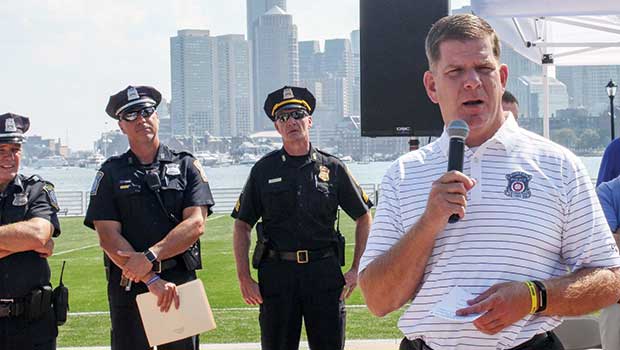Police end body-worn camera pilot
Walsh won’t promise to enact full program, will wait on study

The Boston Police Department’s body-worn camera pilot program came to a close on Monday, with its future unclear. While activist Segun Idowu says the police could — and should — roll out a formal program, Mayor Martin Walsh declined to commit to full body camera implementation in Boston. Instead, he said, he would review the pilot program data to inform his next actions.
“My administration is committed to looking at what happens with the program,” Walsh told the Banner. “It’s my understanding that the program went really well —that we didn’t have any concerns with it, meaning there were no big problems. We’ll look at the information and see what we need to do here.”
He later provided a statement to the Banner suggesting his thinking on use of the devices remains exploratory.
“We want to be sure any new investment in public safety supports the transformative progress we have made in community policing,” he said. “We look forward to learning more about the role body cameras can play in advancing this progress.”
A spokesperson for the mayor said that a preliminary analysis of the pilot is expected to be completed within two to three months. Dr. Anthony Braga of Northeastern University is charged with conducting the independent review, which will include a cost-benefit analysis. Police spokesperson Mike McCarthy stated in 2016 that the pilot’s success would be evaluated based on factor such as costs, complaints received and impact on community relations.
Activists have faced a lengthy battle to get to this point. Boston Police Camera Action Team, formed in 2014, pushed for several years to get a body a camera program enacted. In 2016, the city agreed to test one out. After overcoming police union resistance that delayed the program’s start, a six-month pilot was launched in Sept. 2016, and later extended to a full year in order to capture more data. One hundred officers were equipped with cameras.
Now BPCAT is pushing for full implementation of police body cameras by the year’s end, Idowu, BPCAT co-founder, told the Banner.
“We want [body cameras] to be in the budget — we want to see numbers that he’s investing in the program, not just lip service,” Idowu said. “One thing to note is only one of the candidates who’s running for mayor has supported body cameras from the beginning, and it’s not Marty Walsh.”
In his view, there is no need to hold off on equipping cameras until the study is completed. Camera usage is inevitable, he said, and the study will only demonstrate what parts of the current usage policy are effective and what needs to be tweaked.
“The study isn’t [about], does it work for Boston, but how it works for Boston,” Idowu said.
The usage policy is a key concern for BPCAT, which presented its version to the city in 2015, a year before the pilot’s launch. That policy was developed based on community feedback, examination of other urban body camera policies and via collaboration with groups such as ACLU of Massachusetts, the Boston Branch of the NAACP, Digital Fourth and the Harvard Black Law Student Association.
Thus far, Idowu says all the feedback he has received about the pilot has been positive or neutral. Civilians tended to tell him either that they believed a full camera program already was in place or that they wanted one implemented following the pilot, he said. During the pilot’s duration, Idowu informally approached and spoke with officers he saw wearing cameras, who he says spoke positively of the program.
“I’ve not heard anyone make an argument or case against body cameras,” Idowu said.






